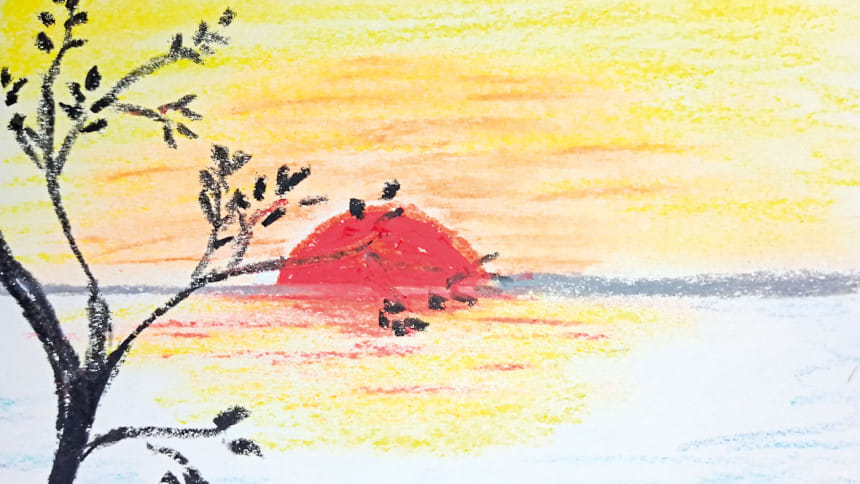At the Wake of Dawn

There were vegetable fields on both sides of the roads. How green and lush they were! The man had a sudden wish to stand by the fields for a while.
The man set out for town at the wake of dawn. It was the month of Phalgun. A nip of chill was still in the air. Wrapping himself in a tattered shawl, he started walking. He had a long way to go, a small river to cross. And then, the town would come into view.
Tukush takush, chirik chirik … the wistful call of so many birds were heard everywhere. The man found a yellow bird with a long tail, flying close to him. Some people called this bird, Kutum. Kutum meaning guest.
The man wanted to say to the bird, "Listen, Kutum pakhi, will you go with me? I will travel far. Can you come with me?"
There were vegetable fields on both sides of the roads. How green and lush they were! The man had a sudden wish to stand by the fields for a while. He wanted to take a deep breath-- to fill his chest with the aroma of fresh vegetables. He felt that it would cure all his illness. As if the green air of the green flora and fauna would enter his body and drive away all his sorrows.
The man was very fond of trees, earth, grass and grasshoppers. But he could never explain to anyone why he loved them so much. When the clusters of Sonalu flowers rustled gently in the breeze, he felt happy. When the crops ripened or when the moon, coated with sandalwood paste, shone brightly in the sky, he was full of joy too. He loved brushing his face against the leaf of a water lily. Such coldness. Such sweet fragrance.
He once sat in a field of linseeds and played his flute through the entire night. "I have seen the fairies," he told everyone. "I saw the milk-white fairies coming down from the sky! Oh, how they danced in a circle in the moon light!" Hearing his stories, the village-people whispered to each other that the man had gone mad.
This was the man who headed towards town at dawn in the month of Phalgun. There was a procession in town that day. That day, there was firing on the streets. It was 21st February 1952.
This man, a little eccentric, was shot in his chest five times. Police took his body in haste and had the dieners throw it in a secluded place outside the town on another dawn. The place was full of grass flowers. Not a single vulture came to devour his body. Only some of the wild ducks that were flying back to the southern country at the end of the winter halted for a second or two while passing over the dead body. However, whether the ducks cried or not, or if their eyes glistened with tears could not be known.
Ali Imam is a Bangladeshi writer and audio-visual organizer. He has been writing exclusively for children for nearly five decades. He has more than six hundred books to his credit. He has written several scientific stories, travel stories and numerous collections of short stories. He was awarded Bangla Academy Literary Award in 2001 in juvenile literature.
Marzia Rahman is a fiction writer and translator. Her translations have appeared in Six Seasons Review, Writing Places Anthology (UK), The Book of Dhaka, The Demoness, and When the Mango Tree Blossomed. In 2017, she participated in the International Literary Translation and Creative Writing Summer School at University of East Anglia in Norwich, UK.

 For all latest news, follow The Daily Star's Google News channel.
For all latest news, follow The Daily Star's Google News channel. 



Comments